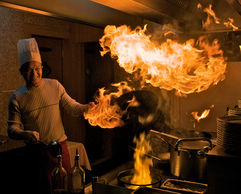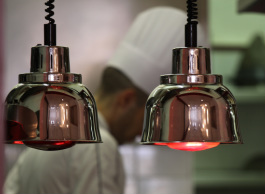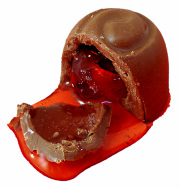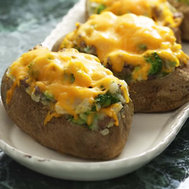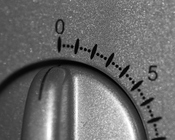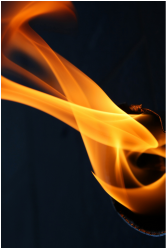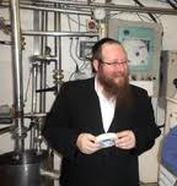BISHUL AKKUM
Kosher Participation
|
Our Sages were determined to cultivate national pride and love of our values, society and culture. Jewish life is a complete system and our Sages instituted various food decrees to socially isolate the Jewish people from their neighbours. One such decree is that of Bishul Akkum; some foods must have Jewish participation in their cooking. Only foods that cannot be eaten raw and that are served at the king's table are subject to this decree.
|
|
|
Served at the King's Table
Foods served at a royal banquet, refers to the main components of main dishes. For example, (tinned) corn might be part of a salad served at a royal banquet, but it would not be served in its own right. For this reason there is no Bishul Akkum prohibition on tinned corn, nor on beer or coffee since it is primarily water. The same may be perhaps true of mashed potato which appears to be used as an adjunct rather than the focus of the menu item, i.e. a steak might be served on a bed of mashed potato. Foods not eaten with a meal or not eaten for nutrition and health e.g. snack foods such as chocolate, are not subject to the decree of Bishul Akkum. Although kings eat chocolate, they are not served at a banquet as a primary food amongst the main dishes. However some argue that fancy chocolates are served at the king’s table. But there is another consideration; Chocolate must undergo a number of different processes. Since the cocoa beans at their first process, roasting, are edible but not yet ready for the king's table, they fall outside the ambit of the Sages’ decree. Rice and corn cakes are similarly excused since in their first stages of manufacture, where they are already edible, they are not yet suited for the king’s table. Potatoes There is a machlokes between the Chochmas Adam (66:4) and the Aruch Hashulchan (Y”D, 113:18) regarding potatoes. The Chochmas Adam deems potatoes subject to the laws of Bishul Akum whereas the Aruch Hashulchan understands that potatoes are not served at a royal table; they are a poor man’s food. Their disagreement probably reflects the mores of times and places in which they lived. Today, roasted baby potatoes are served at the king’s table so we may not eat baked potatoes sold by a street vendor even though they are just potato without any oil or condiment. However, potato chips [deep fried fingers or wedges of potato] and potato crisps [fried thinly sliced or reconstituted potato] are not deemed to be food fit the banquet table. A good rule of thumb would be that any snack food is not subject to the restrictions of Bishul Akkum. Only those foods which are served at a king’s table together with bread are prohibited (Rambam, Laws of Forbidden Foods 17:15, the Gemara uses the same formulation). Thus not only must they be foods chosen to impress the king's visitors, they must be part of the main course, which are eaten with bread. (some suggest that insignificant foods do not lead to social intercourse between Jews and non-Jews but it is more likely that the decree would not have been accepted had it reached too far) We thus find that the Peri Chadash (113:2) writes that desserts are not restricted by Bishul Akum concerns. This is also found in the Chasam Sofer (ShAruch, 113:1) Foods Eaten Raw The Gemara (Avoda Zara 38a) also excludes foods that can be eaten raw notwithstanding that those foods may taste better when cooked. Rav Genack [of the OU] writes (Mesorah 1:89) that fish are probably so defined since sushi is so popular today. Heated but Not for the Purpose of Cooking Foods that are heated or cooked for hygienic purposes and are otherwise not eaten raw, e.g. pasteurised milk, are not included in this decree since they are not cooked in order to make them a better tasting food. Smoked, Pickled, Steamed and Microwaved Foods The Rambam (Hilchos MaAchalos Asuros 17:17) and the Shulchan Aruch (Y.D. 113:13) rule that smoked (and by similar argument pickled) foods are not included in the Bishul Akum restriction. Fire The Rama (ibid.) writes that only foods cooked with heat of a fire are prohibited. Steaming is debated between the Acharonim. (Darkei Teshuva 113:16). The lenient argument compares it to hot smoking, since the food is not directly cooked through fire. Additionally, this process, not yet having been invented, was not included in the original decree. This is the reasoning of HaRav Ovadia Yosef (Teshuvot Yabia Omer 5:Y.D. 9). Microwave cooking uses no fire, also it was not available when Chazal promulgated the Bishul Akum decree and will certainly not be a problem for those who permit steaming. Instant rice is fully cooked (Bishul Akkum) and then dried. It does not require any additional cooking but re-hydration and so is prohibited. Parboiled (partially boiled) rice is steamed with the outer shell to preserve nutritional value and are then pearled and is not prohibited because of Bishul Akkum since a Jew adds to the cooking process. Jewish Participation: Pilot Flame The Gemara (Avoda Zara 38b) rules that Bishul Akum does not apply if a Jew participated in the cooking process. The Rishonim debate the degree of the Jew’s participation required. Rav Yosef Karo (Y.D. 113:7) rules that merely turning on the flame is not adequate. The Rama (ibid.) disagrees. Voice or remote activation a Jew is accepted by some Kosher orgs and rejected by others. The Rama suggests that it is sufficient if the cooking fire originates from a flame lit by a Jew. This is particularly helpful since a pilot light kindled by a Jew will satisfy this criterion. The Aruch HaShulchan however, (Y.D. 113:44) implores that this leniency should not be exploited except in case of great need and only if the cooking occurs in the Jew's home. However it is perfectly acceptable if the pilot flame provides even a minimal amount of heat to the actual cooking. Similarly an electric lamp situated in the oven itself, which has been activated by a Jew, will contribute to the cooking. Also an oven or pot that retains some heat from the Jew’s participation will retain the Bishul Yisroel “cooked by a Jew” status. Jewish Participation: Time Clock Electric cooking devices [or gas devices, that are ignited with an electric spark] that are triggered by a time clock set by a Jew, are also deemed to be cooked with Jewish participation. Workers at Home and in the Factory Tosafos (Avoda Zara 38a s.v. Ela) are unsure whether Bishul Akum applies if a non-Jew cooks in a Jew's home. Rabbeinu Avraham ben David rules there is no problem since the concerns for the decree, inappropriate social intercourse, do not apply. Rabbeinu Tam however argues that we find no such exemption in the decree and that the reason for the decree is not what defines its application. The Halacha follows Rabbeinu Tam (Y.D. 113:1). Some rule that Bishul Akum does not apply to a non-Jew employed by a Jew. The Rama (Y.D. 113:4) seems to rule that one may rely on this opinion BeDiEved i.e. if the food was already cooked. However the Shach (113:7) and the Aruch Hashulchan (Y.D. 113:4) are not happy about this. One should make every effort not to rely on the lenient views. Rav Moshe Feinstein cited by Rav Nata Greenblatt (Mesorah 1:94) rules that Bishul Akum does not apply to factory manufactured foods that can not be produced in a household kitchen. The Utensils Used by the Gentile The RaShBa maintains that utensils will become not-Kosher by absorbing tastes of such foods. The Rosh disagrees. The Shulchan Aruch (Y.D. 113:16) mentions both opinions but presents the Rashba as the preferred Halacha. However, he concedes that in this case earthenware utensils (which usually can not be koshered) may be “Koshered” if Kashered three times. The Aruch Hashulchan (113:50) writes that the Rashba's strict ruling is to be followed. |
